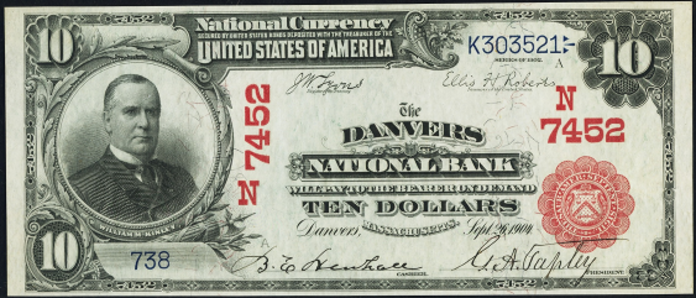Ten Dollar Notes › Nationals › 1902 Ten Dollar National Bank Notes › Indiana Charters › 1902 $10 Kirklin Indiana First National Bank
Get Value Now
| Item | Info |
|---|---|
| Series | 1902 |
| Charter | #9115 First National Bank of Kirklin, Indiana |
| Year Chartered | 1908, 323 Banks Chartered |
| City Info | Kirklin is a town in Kirklin Township, Clinton County, Indiana, United States. The population was 788 at the 2010 census. The town was named for Nathan Kirk, a local pioneer settler. Nathan Kirk, the first white settler in eastern Clinton County, laid out the town of Kirklin in the early 1830s, the original plat consisting a row of seven blocks on either side of the Michigan Road. An addition filed on October 24, 1836 added blocks to the east, west and south sides of the original plat. Edward Miller established the first general store in a log building and William Wynkoop built the first hotel; other early businesses included Hiram Dougherty's cabinet shop, James Hollcraft's bar, John Heffner's blacksmith shop, Columbus Kemp's tannery and M. Z. Saylor. Source: Wikipedia |
| Similar Cities | City name is unique, no others like it. |
| Seal Varieties | Red, Blue |
| See Also | If your note doesn't match try: 1. 1907 $10 Gold Certificate 2. 1901 $10 Legal Tender 3. 1908 $10 Silver Certificates |
| Other Info | 1. Value depends on notes known for charter, condition and market demand. |
| Neat Fact | Red Seals issued in sheets of 4 Notes: 3 $10 Notes, 1 $20 Note. Less commonly 4 $20 Notes (Friedbergs, 20th Ed. P129) |
No Obligations Offers and Appraisals
Please submit a good photo or scan. It will be identified and evaluated. Understand there may be subtle differences between the image you see above and your note. Signatures, design, markings and note condition will determine the offer price. Notes in Uncirculated or better condition receive the best offers.
Appraisals can be estimated for wholesale and retail prices. Wholesale is what dealers typically pay. Retail is what a collector might pay. Retail is slightly higher in most cases.
Please visit this page for USA Paper Money Reference. Do not treat this page as a reference guide, it is for appraisal and acquisition purposes only.
